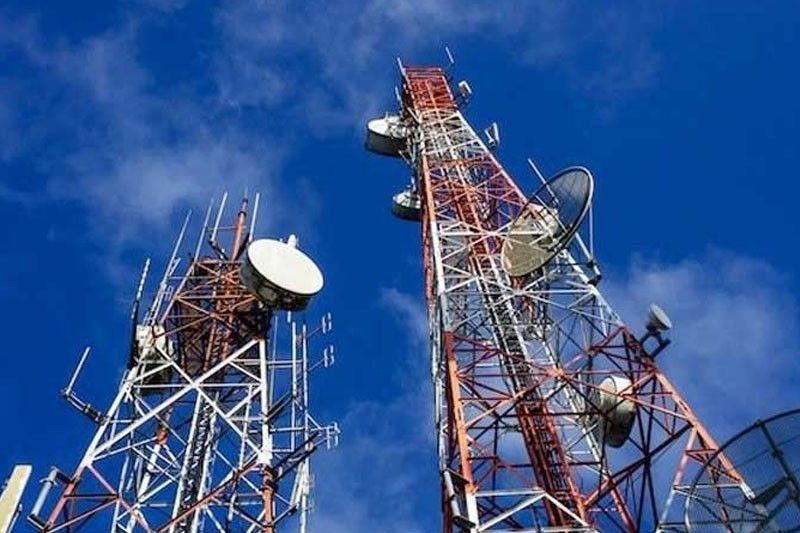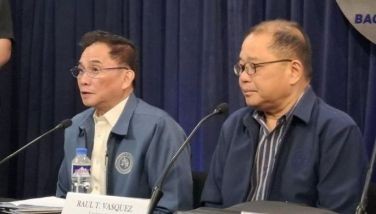ARTA orders LGUs to release telco permits

MANILA, Philippines — The Anti-Red Tape Authority (ARTA) has ordered select local government units (LGUs) to release permits for building cell sites, applications for which have exceeded the seven-day processing period and have completed requirements, in line with a presidential directive.
In a statement, ARTA said it sent compliance orders on Tuesday to Puerto Princesa City and Rizal in Palawan; Miag-ao, Cabatuan, Estancia and Leon in Iloilo; Kalibo in Aklan; Masbate City; Bulan in Sorsogon; Canaman in Camarines Sur and San Jose in Occidental Mindoro to direct the LGUs to release all license, clearance, permit, certification or authorization applications for putting up telco towers, facilities, equipment and service pending for more than seven days but have complete requirements.
ARTA issued the compliance orders as the LGUs were confirmed to have received applications which have been fully paid and have the required documents, based on the list of pending applications submitted by Smart Communications Inc.
During a meeting held last week, ARTA required telco firms Smart and Globe Telecom Inc. to submit a list of all their pending applications to the agency.
More pending applications of Smart are being verified, while Globe has yet to provide ARTA with its list.
To properly monitor compliance with the prescribed processing period for permits, ARTA also directed the LGUs to submit a report within three working days from receipt of the compliance order.
The report should provide a list of all approved and pending applications with corresponding reasons why the permits have yet to be released, as well as a list of those requiring approval from the LGUs’ Sanggunian.
“We want to remind everyone that the submitted applications with the LGUs that have been pending are deemed automatically approved by law if unacted upon within seven working days from its complete submission and payment of all required fees,” ARTA director general Jeremiah Belgica said.
Under Section 15 of Republic Act 11032 or the Ease of Doing Business and Efficient Government Service Delivery Act, licenses, clearances and permits for building and operating telco towers should be processed within seven working days for those issued by the barangay, LGUs and NGAs (national government agencies).
Failure to act on the application within the prescribed processing period would mean the application is approved.
“There is no more choice for the LGUs or NGAs but to issue the appropriate permits because it was already approved by Congress itself. Refusal to follow this very clear provision of the law will lead to admin and criminal cases to be filed,” Belgica said.
ARTA’s issuance of the compliance order follows the signing of Joint Memorandum Circular (JMC) 01-2020 by the agency with the Department of Information and Communications Technology (DICT), Department of the Interior and Local Government, Department of Public Works and Highways, Department of Human Settlements and Urban Development, Civil Aviation Authority of the Philippines and the Food and Drug Administration (FDA) for the streamlined permitting process for telco towers.
Set to take effect on Aug. 20, the JMC reduces the processing time for permits for telco towers to 16 days from 241 days, as well as cuts the number of documentary requirements to 35 from 86.
Duterte has said there should be no delays in release of permits for towers as such are needed to provide access to telco services.
Last year, ARTA declared the automatic approval of 3,120 pending applications from the Land Transportation Franchising and Regulatory Board and 3,125 pending applications for renewal from FDA.
Big tower firms withdraw interest
Some big foreign tower companies have withdrawn their interest to take part in the country’s program that seeks to promote the use and accelerated rollout of common towers due to concerns in the current policy, the DICT said.
Speaking during the Kapihan sa Manila Bay virtual forum yesterday, DICT Undersecretary RJ Jacinto said more tower firms could follow suit if their concerns are not addressed and the guidelines are not improved.
“Although there are some guidelines issued, interim guidelines, but the big tower companies are not happy with the present situation and they are expressing that they might back away already,” Jacinto said.
“They wrote a letter to (DICT) Secretary (Gringo) Honasan with a copy to me that they wanted the guidelines improved,” he said.
Jacinto said one of the big tower firms backing out is IHS Towers, a mobile telecommunications infrastructure provider in Africa.
The official did not enumerate the issues being raised by the tower firms, but said one of the concerns is on who should be allowed to build.
“The knowledgeable common tower providers are foreigners, because they have the experience. So for them to enter, they have to be assured of the viability of the market,” Jacinto said. “The interim guidelines say that everybody can build. Of course those who know how to build will lose interest.”
Jacinto said other experienced tower companies have also expressed concerns and if these are not addressed, “they might back out too.”
ARTA’s Belgica during the same webinar supported Jacinto’s claims, pointing out that some tower companies are actually hesitant to build towers in the country.
Belgica suggested that incentive packages be provided to these tower firms.
The DICT last month issued the much anticipated guidelines for the common tower policy.
Under the policy, the DICT encourages the growth and development of independent tower companies as a pioneering sector for ICT, in line with the overall objective of enhancing wireless network coverage and quality of services across the country.
Under the initiative, the DICT intends to put up at least 50,000 new common towers nationwide over the next couple of years to augment the existing close to 18,000 cell sites. – Richmond Mercurio
- Latest
- Trending






























